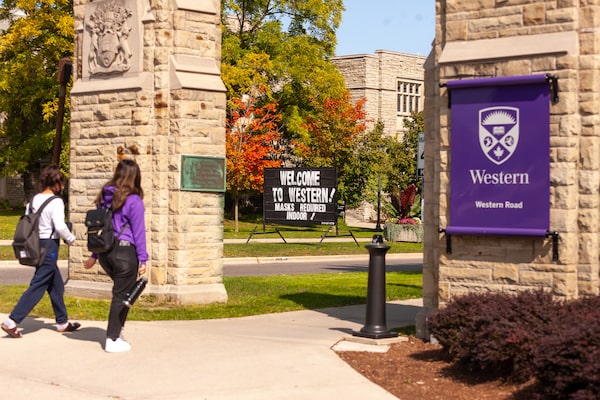
In recent years, efforts to eliminate campus sexual violence have been cast in a spotlight.Mark Spowart/The Canadian Press
The University of Western Ontario is reeling after a first-year student died of his injuries following an early-morning assault and police opened a separate investigation into social-media reports of young women being drugged and subject to sexual violence at a university residence.
Gabriel Neil, 18, died in hospital on Sunday after an assault early Saturday near campus in London, Ont. A 21-year-old male has been charged with manslaughter. In an e-mail Monday, a London Police spokesperson said that assault was not believed to be connected to the allegations of sexual violence at a campus residence this weekend.
Allegations of sexual violence at a Friday night gathering at Medway-Sydenham Hall, a campus student residence, circulated on TikTok and Twitter in recent days. Western administrators and police in London said they had not received any reports of such incidents and appealed for people to come forward with information.
London police said they are aware of information circulating on social media, and that based on the seriousness of the allegations, they had opened an investigation. Since students returned to campus last week, Western said it has received four complaints of sexual violence. None are believed to be connected, nor are they tied to the allegations that emanated this weekend from Medway-Sydenham Hall.
In recent years, efforts to eliminate campus sexual violence have been cast in a spotlight as research has shown that women of university age are at high risk of assault, particularly in the first weeks after arriving on campus.
Chris Alleyne, interim associate vice-president for student experience at Western, said the university is “troubled and worried” by this weekend’s reports of alleged assaults.
“We’re working really hard to clarify and confirm the information. But so far, we’ve received very little information related to these reports. So we’re asking our students and campus community to come forward with any details,” Mr. Alleyne said in an interview, adding that the university was committed to working with police.
The allegations first came to the attention of the university officials via rumours picked up by campus residence staff on Saturday, Mr. Alleyne said. That same evening, an employee sent an e-mail to students in residence asking people to come forward, offering assistance and wanting to ensure that anyone who had been hurt could seek help.
Those efforts continued Monday, but the university still had not received any response to its request for information on the alleged incidents. The university said it had stepped up security in residences and had counsellors, including experts in gender-based violence, on site to assist students.
Mr. Alleyne said in a statement that Western had taken swift action in response to the four known complaints of sexual violence from last week, “including facilitating arrest and removing students from residence while investigations continue.”
News of the investigations has underscored the importance of consent work and education before students get to college or university campuses, says Farrah Khan, co-director of Courage to Act, a national project to address and prevent gender-based violence at postsecondary institutions in Canada.
Over the last several years, Ms. Khan says there has been a sea-change in terms of colleges and universities acknowledging the need to address sexual violence on their campuses. But she says those efforts – whether it’s dedicated offices or mandatory training – remain unequal across the country.
“Universities and colleges can do better and should do better. But we’re also setting students up to fail by not giving them comprehensive sexual health, relationship and consent education throughout grade school and high school,” she said.
Especially given the risk of violence that students face during the first few weeks of life at a postsecondary institution, Ms. Khan stresses that the work must begin much earlier.
“What are we doing to educate them so they’re ready?” she said.
A StatsCan report found that in 2019 slightly more than one in 10 women in a Canadian postsecondary setting reported being assaulted in a single year. More than 70 per cent witnessed or experienced unwanted sexual behaviour, the report said.
Mr. Alleyne said that sexual violence will never be tolerated at Western.
He said that as part of the university’s commitment to a safe campus, it conducted sexual violence education and prevention programming with incoming first-year students last week, including programming on consent, healthy relationships and addressing rape culture. Student residence staff and other student leaders are also trained on the university’s sexual and gender-based violence policy and in how to refer students to appropriate services should a complaint arise.
Lauryn Bikos, a third-year student at Western and an orientation leader, said on Twitter that the events of the weekend had a terrible impact on the campus community. Many other students echoed her views.
“I walked students home Friday night to Med Syd. I thought I was taking them to safety. I don’t even want to think of the number of students who no longer feel safe in their rooms, and started this new chapter of their lives with fear and trauma,” Ms. Bikos said.
Other students on social media mentioned feeling unsafe on campus.
Our Morning Update and Evening Update newsletters are written by Globe editors, giving you a concise summary of the day’s most important headlines. Sign up today.